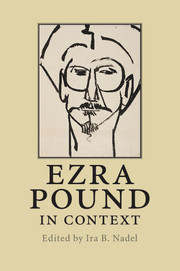Book contents
- Frontmatter
- Contents
- Notes on contributors
- Acknowledgements
- Chronology
- List of abbreviations and note on references to The Cantos
- Introduction
- Part I Biography and works
- Part II Historical and cultural context
- 16 The classics
- 17 Provençal and the troubadours
- 18 Dante and early Italian poetry
- 19 America
- 20 Venice
- 21 London
- 22 Paris
- 23 Rapallo and Rome
- 24 Pisa
- 25 Imagism
- 26 Vorticism
- 27 Music
- 28 Visual arts
- 29 Confucius
- 30 The Orient
- 31 Little magazines
- 32 Publishing and publishers
- 33 Modernism
- 34 Fascism
- 35 Anti-Semitism
- 36 Gender and sexuality
- 37 Race
- 38 Travel
- Part III Critical reception
- Further reading
- Index
29 - Confucius
Published online by Cambridge University Press: 05 July 2014
- Frontmatter
- Contents
- Notes on contributors
- Acknowledgements
- Chronology
- List of abbreviations and note on references to The Cantos
- Introduction
- Part I Biography and works
- Part II Historical and cultural context
- 16 The classics
- 17 Provençal and the troubadours
- 18 Dante and early Italian poetry
- 19 America
- 20 Venice
- 21 London
- 22 Paris
- 23 Rapallo and Rome
- 24 Pisa
- 25 Imagism
- 26 Vorticism
- 27 Music
- 28 Visual arts
- 29 Confucius
- 30 The Orient
- 31 Little magazines
- 32 Publishing and publishers
- 33 Modernism
- 34 Fascism
- 35 Anti-Semitism
- 36 Gender and sexuality
- 37 Race
- 38 Travel
- Part III Critical reception
- Further reading
- Index
Summary
If a man have not order within him He can not spread order about him
(Canto xiii/59)In the Western intellectual tradition, Ezra Pound stands as a unique Confucian disciple. After Christian missionaries to China first introduced the thought of Confucius to European readers in the seventeenth century, the Chinese sage consistently attracted admirers and adherents including such renowned Western thinkers and writers as Leibniz, Voltaire, and Emerson. But unlike his distinguished predecessors, whose interest in Confucianism stemmed primarily from the presumption that its rational philosophy could serve to legitimize their own Enlightenment ideal of a modern socio-political formation founded on reason, Pound was drawn to another element. Within Confucianism, he located the empowering means to resist the socio-political alienation of humanity engendered by the conditions of Western capitalist modernity.
With this profound agenda, Pound was able to surpass all his Western predecessors both in the depth of his grasp of Confucian ideas and in the extent of his commitment to transmitting these ideas – “the blossoms from the east” – to the West (xiii/60). But Pound was never content to act merely as a passive transmitter of Confucian ideas. Instead, he sought to establish Confucianism's contemporary relevance by reinventing a new Confucian humanist discourse – an ideological weapon that could help him to address effectively the “immediate need” of a Western world in crisis (SPR, 75). He effected this reinvention of Confucianism through his creative translations, poetic configurations, and theoretical formulations.
- Type
- Chapter
- Information
- Ezra Pound in Context , pp. 324 - 334Publisher: Cambridge University PressPrint publication year: 2010

